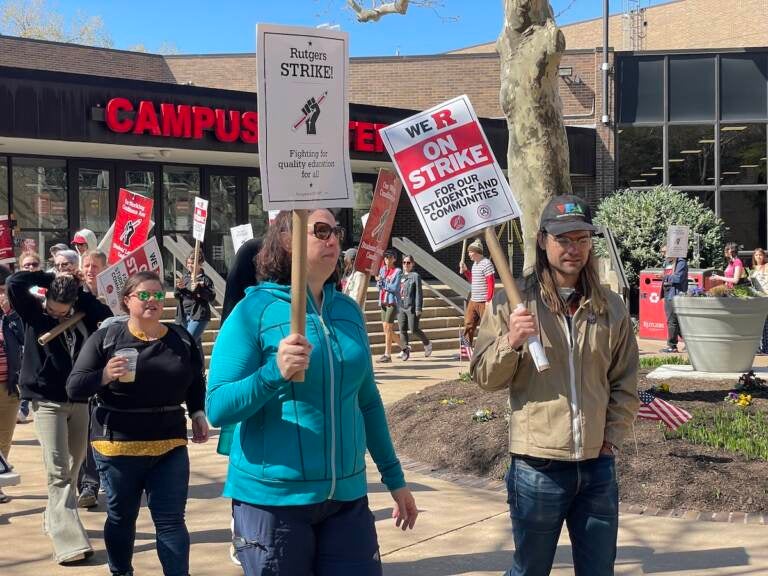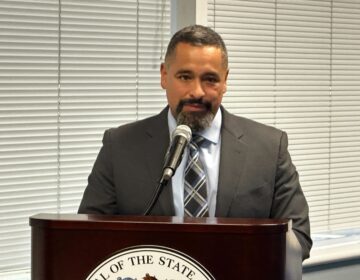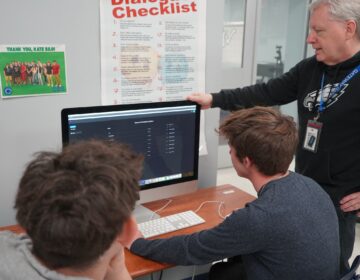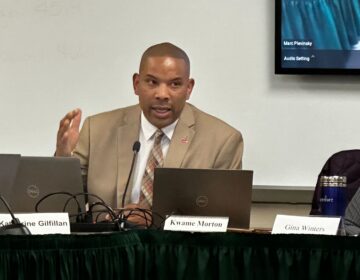Rutgers strike: Faculty members march for higher pay, equal treatment of colleagues and campuses
Dozens march the picket line at Rutgers-Camden Monday as union members demand higher wages, equal treatment of faculty, and equitable investment in all three campuses.

Dozens marching on the picket line in front of the campus center at the Camden campus of Rutgers University (P. Kenneth Burns/WHYY)
It’s not just about a pay raise for striking full-time faculty members at Rutgers University. It’s about putting everyone on equal footing.
“As a full-time tenured professor, I’m actually in a privileged position here at Rutgers,” said Kate Cairns, an associate professor in the childhood studies department at the Camden campus. Cairns adds that she works with adjunct colleagues who have to reapply for their positions every year and are not paid equally compared to full-time counterparts.
“I also work with graduate students here at Rutgers who don’t have access to a living wage,” she said.
They are walking the line in front of the campus center at the Camden campus of Rutgers. @WHYYNews #NewJersey pic.twitter.com/NPxK0JfUB7
— P. Kenneth Burns (@PKBNews) April 10, 2023
She is among dozens who have formed a picket line in front of the Campus Center off of Third Street in Camden. The call for a strike was made Sunday night after leaders for three unions told members in a virtual meeting that there was no movement on proposals they’ve sent to negotiators for the administration.
Dozens were out and ready to march when demonstrations began at 9 a.m. Monday, more joined the line by noon –– including members of other unions who marched in solidarity.
“A lot of people that live in Camden are impacted by Rutgers and the way that their workers are treated,” said Benjamin Saracco, who lives two blocks from the campus. “That’s why my sign says, ‘community rights are workers rights,’ I really believe that’s true.”
Saracco, a librarian at Rowan University and is a member of the American Federal of Teachers Local 2373, said that investment in the Camden campus is not done in the same way compared to the New Brunswick campus, the largest of the three campuses.
“There really is inequity here,” he added. “It also trickles down to the way that the community is treated in many ways.”
The unions are not only seeking equal pay for work and job security, but want to see a living wage for grad students, a rent freeze for all Rutgers owned properties, and for the Camden and Newark campuses to be treated the same as the New Brunswick campus.
Pay inequities across the three campuses have been known for years, according to Jim Brown, associate professor of English and president of the Camden chapter of the Rutgers AAUP-AFT, the full-time faculty union.
“Those pay inequities are a major, major problem,” he said. “It means that the students that come to Rutgers-Camden pay the same tuition, but are standing in front of a professor who makes 30% less than their colleague in New Brunswick.”
As of noon Monday, Rutgers is open –– though whether students are attending in-person classes remains a question. Some have gone virtual like Julio Dagand, a first-year undergraduate student at the Camden campus. He said his history professor warned his class about a possible strike.
“He was like, ‘if push comes to shove, if they strike, I strike’ [and] this class is canceled for the foreseeable future,” Dagand said, adding the professor prepared lessons in anticipation of the strike and plans on keeping up with them.
“I’m treating all my due dates as is just because the last thing I need is for the strike to halt and for classes to resume and I get caught flat footed,” he said
Dagand said he supports the professors involved in the labor dispute, and encouraged them to “get some good insoles, get lots of snacks, lots of hydration, get your sunscreen on, get ready for the long haul.”
But “hopefully it doesn’t come to that,” he added.
Zima Amduka, a senior psychology major at the New Brunswick campus, had mixed emotions about the strike. She said she was “very outraged” because she feels “professors should be getting a living wage.” She also expressed concerns about graduation and said her plans on attending graduate school are up in the air.
“Let’s say the strike goes on to however long it does, what am I going to do about my finals? What am I going to do about the assignments,” Amduka said. “I’m taking their prerequisites for grad school. So, if I don’t do anything in that class and I’m not learning anything, especially if it’s essential for my degree, how is that going to help me in my career and what I’m going for?”
Union leaders and university officials met with Gov. Phil Murphy in Trenton Monday afternoon over the labor dispute. During a news conference announcing an executive order, Murphy said that he told both sides that he was “not happy” that the dispute has reached this point, but pledged to help work towards a resolution.
“I am happy that we’re able to get into a room together,” he said, adding he is “not a fan” of a deal that would result in higher tuition for students. “I expect a deal that is a fair deal for all parties ASAP.”
Disclaimer: Rutgers University is a WHYY underwriter.

Get daily updates from WHYY News!
WHYY is your source for fact-based, in-depth journalism and information. As a nonprofit organization, we rely on financial support from readers like you. Please give today.







